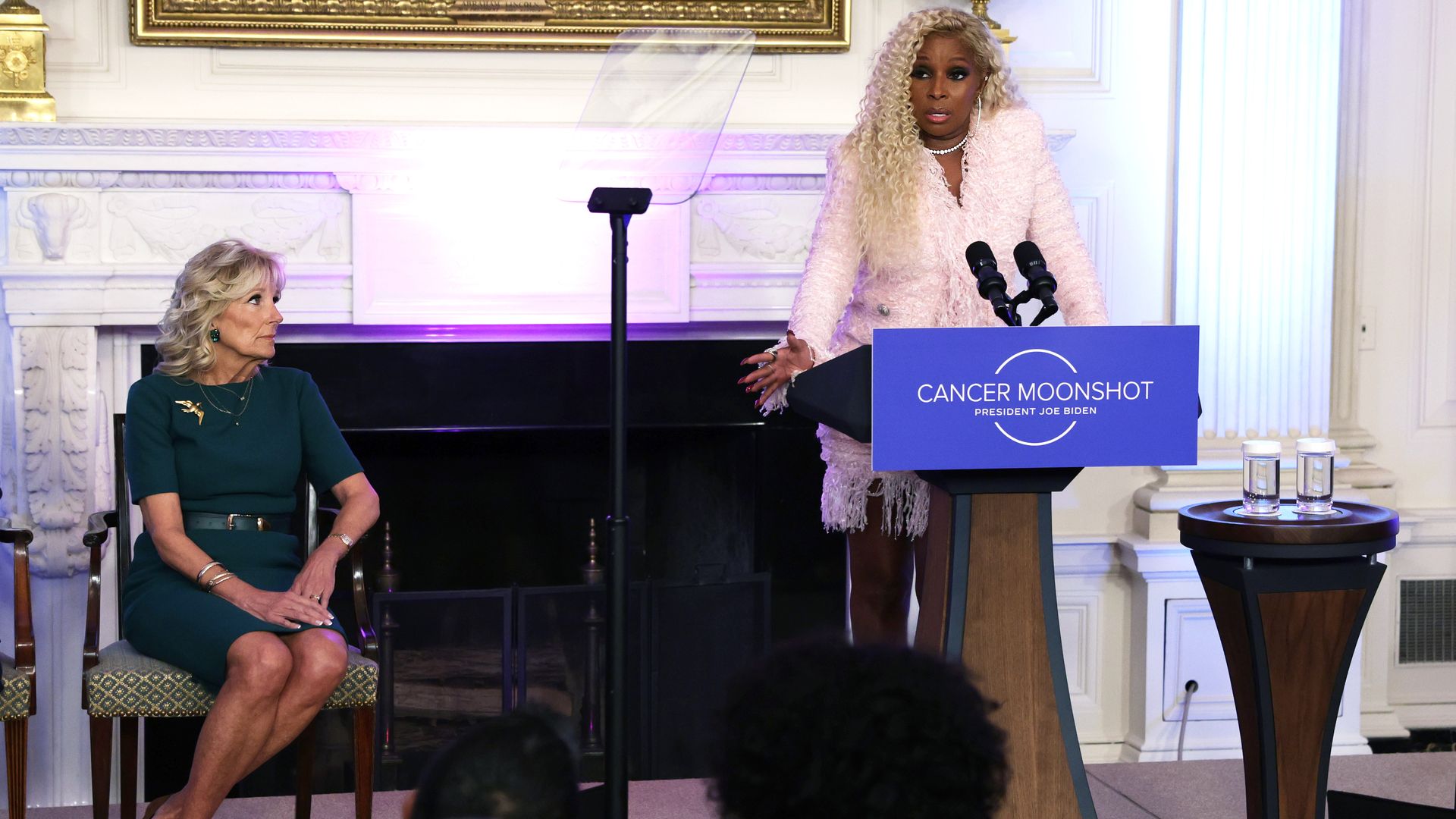| |
| |
| |
| Presented By PhRMA |
| |
| Axios Vitals |
| By Tina Reed · Oct 25, 2022 |
| Good morning, Vitals readers. Today's newsletter is 946 words or a 3½-minute read. 🦃 Situational awareness: As President Biden gets his updated COVID booster today, he's also expected to announce new efforts to convince Americans to get a shot before Thanksgiving, White House officials said. - That includes sending email reminders to Medicare recipients, as well as hosting pop-up vaccination events, including at the NASCAR Cup Series Championship in Arizona next month.
|
| |
| |
| 1 big thing: The road to OTC birth control |
 |
|
| Illustration: Shoshana Gordon/Axios |
| |
| Reproductive health advocates and Democratic lawmakers are intensifying calls for the Food and Drug Administration to make contraceptives available without a prescription ahead of a closely watched advisory panel meeting next month, Axios' Oriana Gonzalez writes. Why it matters: Health experts say making HRA Pharma's Opill available over-the-counter will prevent more unwanted pregnancies and the need for abortions. - But that hinges on whether insurers will cover it and whether the drugmaker, part of the consumer products giant Perrigo, makes it affordable to those paying out of pocket.
Driving the news: FDA advisers will meet on Nov. 18 to review the application for Opill, which has been available with a prescription in the U.S. since 1973. Catch up fast: More than 50 Democratic House lawmakers this spring pressed FDA commissioner Robert Califf to "follow the science" and swiftly consider applications for OTC birth control pills "without delay and based solely on the data." The big picture: But questions about affordability loom large because under federal law, health plans are only required to cover contraceptives obtained with a prescription. - A 2017 study in Women's Health Issue found that on average adults are willing to pay $15 a month and teens $10 per month for birth control. However, the cost of a pack of oral contraceptives is between $20 and $50, according to the National Women's Health Network.
- It's still unclear what HRA Pharma will charge. The company is "committed to ensuring this product is affordable for anyone who needs it," said Frederique Welgryn, HRA Pharma's chief strategic operations and innovation officer.
Don't forget: The FDA will need to make a final decision on whether to approve the drug, which is likely to come at some point in 2023. The agency is not required to follow the advisory committee's recommendations. |
    |
| |
| |
| 2. Conflicting hospital reports on Medicare losses |
 |
|
| Illustration: Sarah Grillo/Axios |
| |
| Some North Carolina health systems that reported losses providing charity care for Medicare patients also disclosed they made millions from the program in the same years, according to a state report obtained by KHN. Why it matters: All not-for-profit hospitals are required to provide charity care or services for the community's benefit in order to maintain their tax-exempt status. - But the definition of what constitutes charity care is often vague, and hospitals have come under fire for falling short on their obligations or simultaneously practicing aggressive debt collections from patients.
- "The lack of clarity about whether health systems like Atrium gain or lose money treating Medicare recipients reflects how loosely the federal government regulates the way hospitals calculate their community benefits," KHN wrote.
Between the lines: This report comes as hospitals nationwide rail against a scheduled 4% Medicare payment cut due to take effect at the end of the year. By the numbers: Atrium Health, the largest hospital system in North Carolina, reported it provided $640 million in uncompensated services to Medicare patients in 2019, KHN reported. - But the health system also claimed in federal filings for the same year it made $82 million in profits from Medicare and $37.2 million in profits from Medicare Advantage, KHN reported.
- "There is no transparency, no accountability, and no oversight," said North Carolina State Treasurer Dale Folwell, a Republican who is critical of Atrium and other hospitals' business practices, told KHN.
The other side: "As labor, equipment, supplies and inflation continue to drive health care costs higher, the gap between Medicare payments and costs incurred to deliver the quality care we provide has grown in the post-COVID inflationary environment," Atrium spokesperson Dan Fogleman told KHN in a statement. |
    |
| |
| |
| 3. Couples therapy goes digital |
 |
|
| Illustration: Allie Carl/Axios |
| |
| There's been a huge uptick in both the demand for and spending on mental health services for individuals in recent years — and plenty of virtual care companies are jockeying to fill the need. Now, startups are eyeing the market for digital couples therapy. Driving the news: A startup called Ritual is rolling out virtual tools to help people build and sustain meaningful relationships, Axios' Erin Brodwin writes. While the vast majority of recent deals in the behavioral health sector focus on one-on-one support, it's one of several couples-focused ventures to emerge in recent years including: - Ours, a Houston-based provider of premarital therapy for engaged couples, raised $5 million in pre-seed funding in May.
- Paired, a London-based developer of virtual relationship guides, pulled in $3.6 million in seed financing last year.
- Talkspace acquired the marriage counseling startup Lasting in 2020.
The bottom line: "You could say relationships is niche, but we're social beings, and relationships make our lives worth living," said Ritual CEO David Pruwer. |
    |
| |
| |
| A message from PhRMA |
| Americans want policy reforms that improve their insurance |
| |
 |
| |
| Did you know 39% of insured Americans say they don't understand what's covered by their insurance? Health insurance coverage should be predictable and transparent, and insured Americans agree. Learn more from PhRMA's latest Patient Experience Survey report. |
| |
| |
| 4. Pic du jour |
 |
|
| Singer Mary J. Blige speaks as U.S. first lady Jill Biden listens in the State Dining Room of the White House on Monday. Photo: Alex Wong/Getty Images |
| |
| Singer Mary J. Blige was at the White House on Monday at an event to launch the American Cancer Society's National Roundtables on Breast and Cervical Cancer. - Blige advocates for increasing breast cancer screening rates, particularly among Black women, after the loss of family members to breast and cervical cancer.
- "The practice of not wanting other people in our business and keeping these topics to ourselves is so deeply rooted into our culture," Blige said. "It wasn't until many years later that I learned that being proactive about our health is not something we should keep to ourselves."
- She noted that while screening rates for white women and Black women are comparable, Black women are more likely to be screened at lower-resourced facilities and experience longer intervals between detection, diagnosis, and treatment.
|
    |
| |
| |
| 5. Catch up quick |
| 💻 Embattled telehealth startup Cerebral is cutting 20% of its workforce as it restructures. (Wall Street Journal) 🩺 JPMorgan is still dabbling in employee health care, announcing this week it is launching office-based primary care locations in Ohio with partner Vera Whole Health. (Modern Healthcare) 💊 Researchers are testing several new drugs to treat depression and anxiety symptoms that women frequently experience during perimenopause, (Wall Street Journal) |
    |
| |
| |
| A message from PhRMA |
| How insured Americans navigate unclear insurance coverage |
| |
 |
| |
| According to new findings, insured Americans favor policy solutions that improve their ability to navigate and access their care while lowering their out-of-pocket costs. An example: Tackling the barriers introduced by insurers and middlemen like pharmacy benefit managers. Read more. |
| |
| Thanks for reading, and thanks to senior editor Adriel Bettelheim and copy editor Bryan McBournie for the edits. Please ask your friends and colleagues to sign up. |
 | | Why stop here? Let's go Pro. | | |









No comments:
Post a Comment